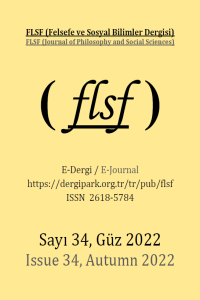Abstract
Dil düzeni, Levinas için öznenin konumlandığı, temellendiği ve Lacan için de öznenin yeniden oluştuğu düşünce dizgesinde ortaya çıkar. Özne, toplumsal/sembolik düzen tarafından öngörülen terimlerle kategorize edilen sosyal bir öznedir; çünkü ötekiyle herşeyden önce sembolik ve toplumsal düzeyde ilişki kurar. Kimliğini öteki ile yüzleştiği zaman, simgesel alanda, dil aracılığıyla kendini gerçekleştirerek oluşturur. Özne, varlığın bütünlüğünün egemenliğine karşı, kendisi aracılığıyla direniş anlarının yaratıldığı bir dilsel düzendir; dolayısıyla dilin düzeni, bir uyum ve direnç alanı, bir bütünlük ve sonsuzluk alanıdır. Dil, öznenin kendisini bir yasalar ve anlamlar sistemi tarafından bir başkası tarafından düzenlenmiş bulduğu bir düşünce sisteminin temel bir bileşendir. Her iki düşünür için de dil kurucu bir şekilde özneler-arasıdır.
References
- Alphonso Lingis, Çeviren, Collected Philosophical Papers, Dordrecht, Boston: Lancaster, Martinus Nijhoff Publisher, 1987
- Alphonso Lingis, Çeviren, Totality and Infinity, Pittsburgh, Pennsylvania: Duquesne University press, 2007 Murat Erşen, Çeviren, Levinas Sözlüğü, İstanbul: Say Yayınevi, 2011
- Alphonso Lingis , Çeviren, Otherwise than Being or Beyond Essence , USA: Duquesne University Press, 2011
- Bruce Fink, Héloïse Fink, Russell Grigg, Çevirenler, Écrits , New York-London: Norton & Company, 2006
- D. Evans, An Introductory Dictionary of Lacanian Psychoanalysis, New York-London: Routledge, 2005
- D. Fryer, The Intervention of the Other: Ethical Subjectivity in Levinas and Lacan. New York: Other Press, 2004
- Donald Nicholson-Smith, Daniel Lagache, Çevirenler, The Language of Psycho-analysis London: Norton, 1974
- J. Lacan, Le Séminaire, Livre IV, La Relation d’Objet, Paris: Seuil, 1994
- J. Indaimo, The Self, Ethics & Human Rights, New York, London: Routledge, 2015
- John Forrester, Çeviren, The Seminar of Jacques Lacan: Book 1, Freud's Papers on Technique, New York- London: Norton & Company,1991
- L. Chiesa, Subjectivity and Otherness: A Philosophical Reading of Lacan, Cambridge, Mass., United States: MIT Press Ltd, 2007 Nihal Akbulut, Çeviren, Saussure, İstanbul: Afa Yayınları, 1985
- Russell Grigg, Çeviren, The Seminar of Jacques Lacan: Book 3, The Psychoses, New York- London: Norton & Company,1997
- S. Zizek, Looking Awry: An Introduction to Jacques Lacan Through Popular Culture, Cambridge, Massachusetts, United States: MIT Press, 1992
Abstract
The order of language emerges in the system of thought where the subject is located for Levinas and the subject is reconstituted for Lacan as well. The subject is a social subject categorized in terms prescribed by the social/symbolic order; for it relates to the other first and foremost on a symbolic and social level. When it confronts the other, it forms its identity in the symbolic space, by self-actualization through language. The subject is a linguistic order in which moments of resistance are created through itself against the domination of the totality of being; hence the order of language is a field of harmony and resistance, a field of unity and infinity. Language is a fundamental component of a system of thought in which the subject finds himself regulated by one system of laws and meanings by another. For both thinkers, language is constructively intersubjectiv.
References
- Alphonso Lingis, Çeviren, Collected Philosophical Papers, Dordrecht, Boston: Lancaster, Martinus Nijhoff Publisher, 1987
- Alphonso Lingis, Çeviren, Totality and Infinity, Pittsburgh, Pennsylvania: Duquesne University press, 2007 Murat Erşen, Çeviren, Levinas Sözlüğü, İstanbul: Say Yayınevi, 2011
- Alphonso Lingis , Çeviren, Otherwise than Being or Beyond Essence , USA: Duquesne University Press, 2011
- Bruce Fink, Héloïse Fink, Russell Grigg, Çevirenler, Écrits , New York-London: Norton & Company, 2006
- D. Evans, An Introductory Dictionary of Lacanian Psychoanalysis, New York-London: Routledge, 2005
- D. Fryer, The Intervention of the Other: Ethical Subjectivity in Levinas and Lacan. New York: Other Press, 2004
- Donald Nicholson-Smith, Daniel Lagache, Çevirenler, The Language of Psycho-analysis London: Norton, 1974
- J. Lacan, Le Séminaire, Livre IV, La Relation d’Objet, Paris: Seuil, 1994
- J. Indaimo, The Self, Ethics & Human Rights, New York, London: Routledge, 2015
- John Forrester, Çeviren, The Seminar of Jacques Lacan: Book 1, Freud's Papers on Technique, New York- London: Norton & Company,1991
- L. Chiesa, Subjectivity and Otherness: A Philosophical Reading of Lacan, Cambridge, Mass., United States: MIT Press Ltd, 2007 Nihal Akbulut, Çeviren, Saussure, İstanbul: Afa Yayınları, 1985
- Russell Grigg, Çeviren, The Seminar of Jacques Lacan: Book 3, The Psychoses, New York- London: Norton & Company,1997
- S. Zizek, Looking Awry: An Introduction to Jacques Lacan Through Popular Culture, Cambridge, Massachusetts, United States: MIT Press, 1992
Details
| Primary Language | Turkish |
|---|---|
| Subjects | Philosophy |
| Journal Section | Research Article |
| Authors | |
| Publication Date | December 10, 2022 |
| Submission Date | June 3, 2022 |
| Acceptance Date | November 14, 2022 |
| Published in Issue | Year 2022 Issue: 34 |
Cited By
Nietzsche’de Dünyaya Farklı Bakmanın Bir İmkânı Olarak Türk Dili
Temaşa Erciyes Üniversitesi Felsefe Bölümü Dergisi
https://doi.org/10.55256/temasa.1633312
Starting from 2024, our journal will be published in 3 issues as two regular and one special issues. These issues will be published In May (regular issue), September (special issue) and December (regular issue).
Only articles within the scope of the file will be included in our special issue.
Thank you for your attention.

